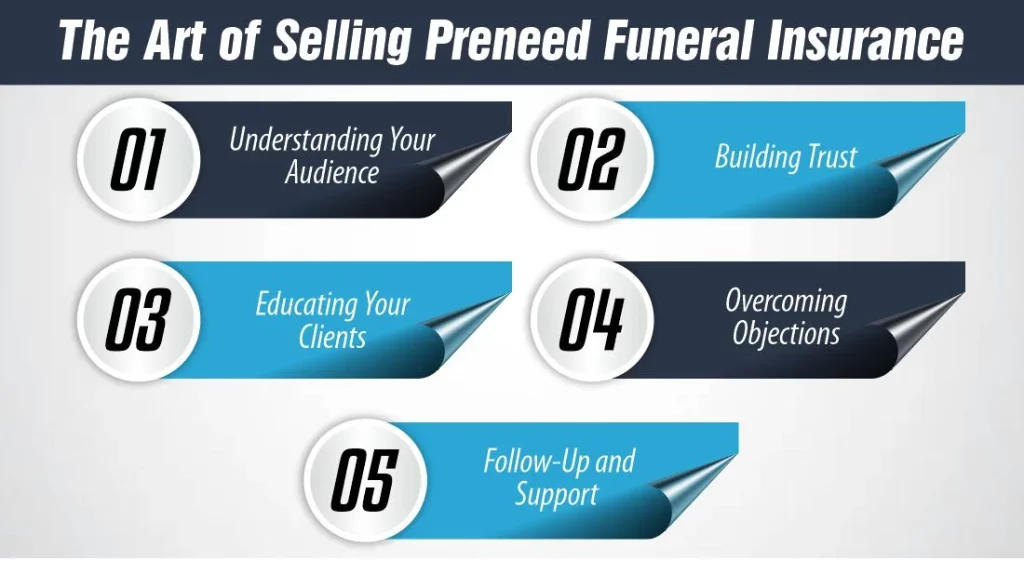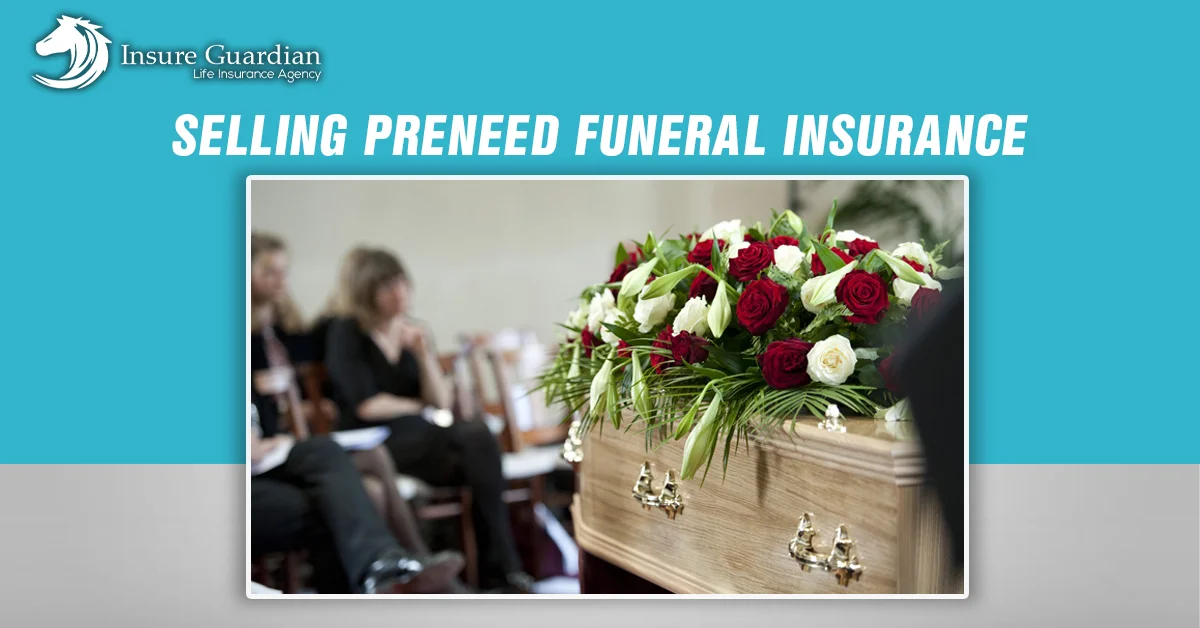In the world of financial planning, one often overlooked but crucial aspect is preneed funeral insurance. As individuals become more proactive in securing their future, the importance of planning for end-of-life expenses cannot be overstated.
However, selling preneed funeral insurance requires a lot of consideration and evaluation of many factors. It includes a lot of efforts to prepare individuals for getting something that is beneficial after their death while they are alive. Don’t worry, here is a blog guide for you so that you can easily carry out selling preneed funeral insurance.
In this comprehensive guide, we will explore the narratives of selling preneed funeral insurance – a financial tool that not only provides peace of mind but also ensures a dignified farewell without burdening loved ones.
Let’s start with some basic information!
What is Preneed Funeral Insurance?
Preneed funeral insurance is a specialized form of insurance designed to cover the costs associated with funeral and burial expenses. Unlike traditional life insurance, which generally provides a lump sum payment to beneficiaries, preneed funeral insurance is specifically designated to fund funeral-related expenses.
The primary purpose of preneed funeral insurance is to alleviate the financial burden on loved ones during an emotionally challenging time. By planning and securing coverage in advance, individuals can ensure that their funeral expenses are taken care of, sparing their family from the unexpected financial strain often associated with end-of-life arrangements.
One distinctive feature of preneed funeral insurance is its focus on preplanning. Policyholders work with funeral service providers to outline their preferences and make decisions about their funeral arrangements, from the type of service to the choice of casket or urn. Additionally, preneed funeral insurance allows individuals to lock in today’s prices for future services, protecting against the inevitable rise in funeral costs due to inflation.
Why Choose Preneed Funeral Insurance?
Choosing preneed funeral insurance is a thoughtful and strategic decision for several compelling reasons:
Financial Security for Loved Ones
Purposeful Coverage: Preneed funeral insurance is specifically tailored to cover funeral and burial expenses. By designating funds for these purposes, individuals ensure that their loved ones are not left with the financial responsibility of unexpected end-of-life costs.
Locking in Today’s Prices
Protection Against Inflation: Funeral costs tend to increase over time due to inflation. Preneed funeral insurance allows policyholders to lock in current prices, shielding their families from the impact of rising expenses and providing a cost-effective solution.
Customizable Plans
Flexibility for Individual Needs: Providers offer a range of plans that can be customized to suit individual preferences and financial capacities. This flexibility ensures that preneed funeral insurance is accessible and adaptable to a diverse range of needs.
Reducing Emotional Stress
Peace of Mind: Knowing that funeral arrangements are taken care of in advance provides a sense of peace of mind for both the policyholder and their family. It allows individuals to focus on celebrating life and mourning without the added stress of financial burdens.
Personalized End-of-Life Planning
Tailored Arrangements: Preneed funeral insurance involves preplanning with funeral service providers. This allows individuals to make informed decisions about their funeral arrangements, ensuring their final wishes are met and reducing the emotional burden on their loved ones.
No Medical Exam Requirement
Accessible to All Ages: Unlike some life insurance policies, preneed funeral insurance often doesn’t require a medical exam. This accessibility makes it a viable option for individuals of varying ages and health conditions.
Furthermore, choosing preneed funeral insurance is a proactive and considerate step toward securing one’s financial legacy, providing for loved ones, and ensuring a dignified and planned farewell. It’s a comprehensive approach to end-of-life planning that reflects a commitment to both financial responsibility and the emotional well-being of those left behind.

The Art of Selling Preneed Funeral Insurance
Selling preneed funeral insurance requires a delicate balance of empathy, education, and effective communication. It’s not merely about closing a deal but guiding individuals through a crucial aspect of financial planning with compassion and expertise.
Here’s an exploration of the art of selling preneed funeral insurance
1- Understanding Your Audience
- Empathy and Sensitivity: Recognize that discussions about end-of-life planning can be sensitive. Approach conversations with empathy, understanding, and a genuine desire to help your clients secure a dignified future for themselves and their loved ones.
- Identifying the Proactive Planner: Target individuals who are forward-thinking, family-oriented, and concerned about easing the burden on their loved ones during challenging times. These individuals are more likely to see the value in preneed funeral insurance.
2- Building Trust
- In-Depth Knowledge: Equip yourself with a comprehensive understanding of preneed funeral insurance. Be ready to address questions and concerns, demonstrating your expertise and fixing confidence in your clients.
- Transparent Communication: Communicate the benefits of preneed funeral insurance, emphasizing the peace of mind, financial security, and the ability to lock in current prices. Transparency builds trust and fosters a positive client-agent relationship.
3- Educating Your Clients
- Informative Conversations: Use your knowledge to educate clients about the unique aspects of preneed funeral insurance. Explain how it differs from traditional life insurance and the benefits of planning for funeral expenses in advance.
- Real-Life Examples: Share real-life scenarios where preneed funeral insurance has made a significant impact on families, highlighting the tangible benefits in times of need.
4- Overcoming Objections
- Addressing Misconceptions: Acknowledge common objections, such as discomfort in discussing funerals or the belief that traditional life insurance is sufficient. Provide clear and concise explanations to dispel myths and misconceptions.
- Customization Options: Discuss the flexibility of preneed funeral insurance plans. Tailor the coverage to meet the unique preferences and budget constraints of your clients.
5- Follow-Up and Support
- Post-Purchase Assistance: Offer ongoing support to your clients. Ensure they understand the terms of their policy, and be available to address any questions or concerns that may arise.
- Regular Check-Ins: Encourage long-term relationships by periodically checking in with clients. This not only demonstrates your commitment but also allows you to adapt coverage as their needs evolve.
In summary, the art of selling preneed funeral insurance involves combining professional expertise with a compassionate approach. By understanding your audience, building trust through transparent communication, educating clients, overcoming objections, and providing ongoing support, you can guide individuals toward a thoughtful and responsible approach to end-of-life planning. Remember, you are not just selling a product; you are facilitating peace of mind and financial preparedness for the future.
What if you don’t need preplanning funeral insurance anymore?
If you find yourself in a situation where you no longer need preplanning funeral insurance, selling the policy might be a viable option. While selling a preneed funeral insurance policy isn’t as common as selling traditional life insurance, it can be done under certain circumstances.
Here’s a guide on how to navigate the process:
Review Policy Terms
Check the terms of your policy to determine its surrender value. The surrender value is the amount you’ll receive if you decide to terminate the policy before it matures. Be aware of any penalties or fees associated with surrendering the policy. Some policies may have surrender charges, reducing the amount you receive.
Contact the Insurance Provider
Reach out to your insurance company and speak with a representative. They can provide specific details about the surrender process, including the paperwork required and any potential financial implications. Ensure you fully understand the terms and conditions of surrendering the policy. Ask about any potential tax consequences or other considerations.
Evaluate Other Options
Some preneed funeral insurance policies may offer the option to convert into a different type of insurance or investment product. Explore this possibility if it aligns with your current needs. Assess whether keeping the policy might still serve a purpose, even if your circumstances have changed. For example, you might decide to maintain coverage for the benefit of your beneficiaries.
Marketplace for Selling Policies
Explore the secondary market for life insurance policies. Some companies specialize in purchasing life insurance policies from individuals. Be cautious and thoroughly research any potential buyers. If considering the secondary market, consult with a reputable life settlement broker. They can help you navigate the process, find potential buyers, and ensure a fair transaction.
Legal and Ethical Considerations
Be aware of and comply with local regulations regarding the sale of insurance policies. Ensure that any transaction is legal and adheres to ethical standards. If the policy has beneficiaries, discuss your decision with them. They may have insights or preferences regarding the potential sale of the policy.
Remember, the decision to sell preneed funeral insurance is a significant financial step, and careful consideration, professional advice, and thorough research are essential before proceeding.
Is preplanning a funeral a good idea?
Yes, preplanning a funeral can be a good idea for several reasons:
Relieving Burden: Preplanning can relieve your loved ones of the burden of making difficult decisions during a time of grief and stress.
Personalization: It allows you to personalize your funeral to reflect your wishes and values, ensuring your final farewell is meaningful and reflective of your life.
Financial Planning: Preplanning can also involve prepayment, which can help to ease the financial burden on your family and lock in current prices, potentially saving money in the long run.
Ensuring Your Wishes: It ensures that your wishes are carried out, as you have specified them, regarding the type of service, burial or cremation, and other details.
Peace of Mind: Knowing that your funeral arrangements are taken care of can provide peace of mind for both you and your loved ones.
However, it’s important to approach preplanning thoughtfully and with careful consideration, taking into account your financial situation, preferences, and any legal requirements in your area. Consulting with a funeral director or financial advisor can also provide valuable guidance in the process.
Are prepaid funeral plans safe?
Prepaid funeral plans can be safe if you choose a reputable provider and understand the terms of the plan. Here are some factors to consider when evaluating the safety of prepaid funeral plans:
Research the Provider: Look for a reputable funeral home or provider with a solid track record and positive reviews. Check if they are registered with relevant regulatory bodies and adhere to industry standards.
Understand the Terms: Read the contract carefully to understand what is covered by the prepaid plan, including services, merchandise, and any associated fees. Make sure you understand the cancellation and refund policies.
Protection of Funds: Inquire how and where your funds will be held. Some jurisdictions require prepaid funeral providers to place funds in trust or purchase a life insurance policy to protect against bankruptcy or mismanagement.
Transferability: Check if the plan is transferable if you move to a different area or if you change your mind about the arrangements.
Communication: Keep documentation of your prepaid funeral plan in a safe place and ensure your family members or executor are aware of its existence and details.
Legal Protections: Familiarize yourself with consumer protection laws and regulations related to prepaid funeral plans in your jurisdiction to ensure your rights are protected.
By carefully researching providers, understanding the terms of the plan, and taking appropriate precautions, prepaid funeral plans can offer peace of mind and ensure your final wishes are carried out as intended.
What are the disadvantages of funeral cover?
Funeral cover, like any financial product, has its disadvantages. Here are some potential drawbacks to consider:
Cost: Funeral cover premiums can add up over time, especially if you’re paying for cover for an extended period. You need to weigh the cost against the benefit of the cover.
Limited Coverage: Some funeral cover policies may have limitations on the amount they pay out or the circumstances under which they pay out. You should carefully review the policy to understand the coverage limits.
Waiting Periods: Many funeral cover policies have waiting periods before you can claim benefits. This means that if you pass away within the waiting period, your beneficiaries may not receive the full benefit or any benefit at all.
Exclusions: Some funeral cover policies may have exclusions for certain causes of death, such as pre-existing medical conditions or death as a result of certain activities (e.g., extreme sports). Make sure you understand what is and isn’t covered by the policy.
Policy Terms: Like any insurance policy, funeral cover policies have terms and conditions that you need to adhere to. Failure to comply with these terms could result in your claim being denied.
Inflation: Over time, the cost of funerals may increase due to inflation. It’s important to consider whether the benefit amount of your funeral cover will be sufficient to cover future funeral costs.
Cancellation and Refund Policies: Some funeral cover policies may have strict cancellation and refund policies, which could result in you losing some or all of the premiums you’ve paid if you decide to cancel the policy.
Before purchasing funeral cover, it’s important to carefully consider these potential disadvantages and compare policies to find the one that best suits your needs and budget.
Conclusion
Selling preneed funeral insurance is not just about closing a deal; it’s about providing a valuable service that offers peace of mind to your clients. By understanding the product, identifying your target audience, building trust, and effectively overcoming objections, you can make a meaningful impact on the lives of individuals seeking a thoughtful and responsible approach to end-of-life planning.
FAQs
1- What exactly does preneed funeral insurance cover?
Preneed funeral insurance is specifically designed to cover the costs associated with funeral and burial expenses. This includes services provided by funeral homes, burial plots, caskets, urns, and related expenses. Unlike traditional life insurance, the funds from preneed funeral insurance are earmarked for these specific end-of-life costs.
2- How does preneed funeral insurance differ from traditional life insurance?
While traditional life insurance provides a lump sum payment to beneficiaries upon the policyholder’s death, preneed funeral insurance is unique in its focus. It is specifically tailored to cover funeral-related expenses, allowing individuals to preplan and secure funds for their end-of-life arrangements in advance.
3- Can I customize my preneed funeral insurance plan?
Absolutely. Preneed Funeral Insurance offers a range of customizable plans. Policyholders can work with providers to tailor coverage to their individual preferences and financial capacities. This flexibility ensures that the plan meets the unique needs and wishes of each individual.

Meet Haider, our expert Life Insurance Content Writer and Editor. With a passion for clarity, he simplify the complex world of life insurance, delivering informative, polished content tailored to our clients’ needs.







